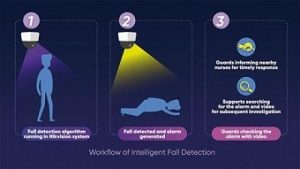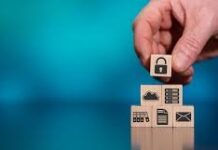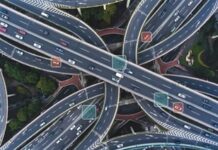
For an elderly or vulnerable person, falling over can have serious health consequences.
“Thanks to the latest AI-powered cameras, fall detection is being improved within care organisations around the world: saving valuable time, and helping to save lives”, says Max Fang, Director of CCTV Products at Hikvision.
When we start to walk as babies, falling over is a natural part of the learning process. But as we age, falling becomes more serious – and for some, it can be fatal.
According to the World Health Organisation, falls are the second leading cause of accidental death anywhere in the world. And for the elderly, the risks associated with falling are especially high. Research from the US reveals that more than one in four people aged 65 and above fall over every year, and a fifth of those falls results in a serious injury such as a hip fracture or a head injury. Importantly, falling just one time will double someone’s chances of falling again.
So, for those organisations tasked with caring for elderly or vulnerable people – such as hospitals, care homes, and retirement communities – steps must be taken to prevent falls, and to deal with those that do happen as quickly as possible.
According to Hikvision, the problem is, current fall monitoring methods still leave vulnerable people at risk. “The simplest way to find out if someone has fallen is to schedule regular visits to check in on them. But this is labour-intensive, and not necessarily effective, as someone could remain fallen and hurt for some time before they are discovered”, says Max Fang.
He stresses, over recent years, elderly and vulnerable people have used personal pendant alarms, which require them to press a button to alert someone when they have fallen over. But these devices have several limitations. Max Fang says:
“For a start, individuals must choose to put them on, and then leave them on – something that is especially challenging for people with conditions affecting memory, such as dementia. The devices must also be fully charged, or have their batteries regularly changed to keep them working. And of course, wearers must then press the button to raise the alarm when they have fallen over. But what happens if they are unable to move, or rendered unconscious?”
According to Hikvision, to provide continuous, reliable fall detection and monitoring, more forward thinking hospitals and care organisations are installing fall detection cameras. “These cutting-edge AI-powered cameras use artificial intelligence to spot when someone has fallen over, and to raise an instant alarm. Artificial intelligence often receives bad press, while being depicted in the movies as something to be feared. And yet, AI is used around the world to help and protect people in thousands of different ways as they go about their work and their lives”, Max Fang says.
An AI-powered fall detection camera constantly scans and monitors a location, detecting when a person is in its field of view, and using pre-programmed height thresholds to identify if that person is upright or not. If the person in the camera’s field of view moves below a specified height, and remains in that place for a set period of time, the camera will classify this as a fall – instantly raising an alarm.
Hikvision’s AI-powered fall detection cameras use the company’s custom-built fall detection algorithm to rapidly detect if a person has fallen over, and send an alert within seconds when a fall is detected. The cameras can be unobtrusively installed within and around care complexes such as canteens, lobby areas, and open spaces outdoors, providing a valuable network of extra eyes to support caregivers in their safeguarding work.
“What is more, through full HD recording, Hikvision cameras allow caregivers to easily investigate the reasons for a fall, enabling them to boost preventative measures if necessary”, Max Fang concludes.











